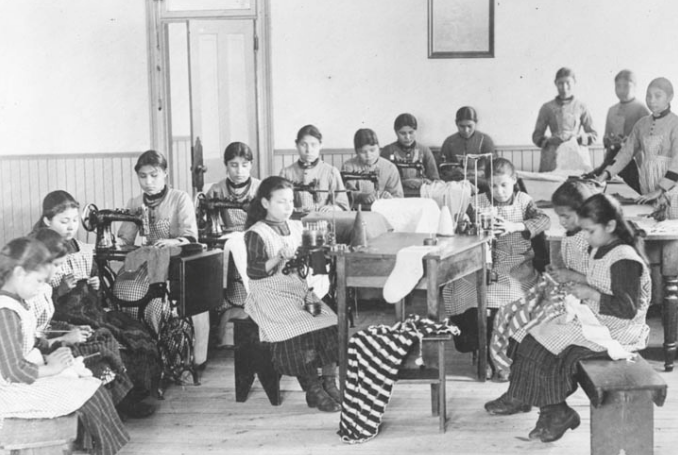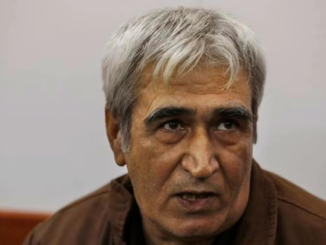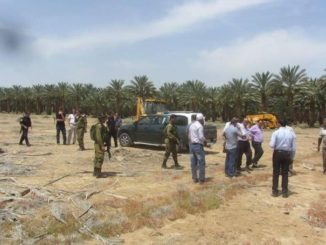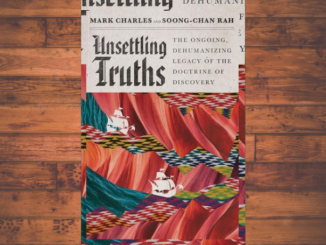
By Benay Blend
In the Jewish faith, there is a saying when someone dies: “May their memory be a blessing.” When many people die, as in the case of settler-colonial regimes, fascist dictatorships, mass shootings, and so on, memory becomes transformed from an individual remembrance to collective. In so doing, it can be used by those seeking justice for the dead.
In Caravan of Death, a made-for-TV series, human rights lawyer Carmen Hertz, spends 40 year seeking justice for her husband who was a political prisoner murdered by Pinochet’s death squads during his reign of terror in Chile. In the beginning, she still had faith in the rule of law, so found it hard to believe that her husband was taken off in the middle of the night to be shot with other prisoners in the desert.
The Caravan of Death landed by helicopter in 16 towns and cities and killed 97 people between 30 September and 22 October 1973, according to the BBC.
Later, Hertz interviews one the officials partly responsible for her husband’s death in hopes that he will give her names. When he tells her that the death squads were aberrations, an example of the insanity that had polluted “his” army, she refuses to accept his excuse. Implying that the murderers were insane, she explains, absolves them of responsibility. Instead, she makes clear that they were acting in a rational manner under the circumstances, i.e., taking orders from a fascist dictator who wanted to rid the country of the resistance.
What happened in Chile—the difficulty of believing that the rule of law was gone; the glossing over of fascist/settler-colonial regimes by calling them anything but what they are—all of that has been repeated over and over again in other countries, other times, and so appears more relevant today than ever.
For example, the uncovering of Indigenous children’s graves associated with a residential school in Canada has exposed the sordid history of state-sponsored genocide that took place, too, in the United States and Australia, both countries that share state-sponsored genocide of Native people. These schools were designed to destroy vestiges of traditional life in the children, but in the process—due to physical abuse, sexual assault, and malnourishment—not only tried to kill the culture but took the lives of children.
“This was a crime against humanity, an assault on First Nations,” Chief Bobby Cameron of the Federation of Sovereign Indigenous First Nations said. “We will not stop until we find all the bodies.”
In the United States, Interior Secretary Deb Haaland has called for an investigation into the federal government’s past oversight of Native American boarding schools, thereby identifying burial sites as well as names and tribal affiliations of students.
Earlier, Interior Secretary Haaland had announced the creation of a committee within the Bureau of Indian Affairs (BIA) to investigate missing and murdered Native Americans, an inquiry that confirms how the past is very much a part of the present, a continuation of violence towards Indigenous people that didn’t end with the closure of the schools.
“To resist Canada,” writes Nyla Matuk, “is to first acknowledge that the Canadian state was, and is, a settler-colonial endeavor” (Resisting Canada: An Anthology of Poetry, 2019, p. 15). Moreover, she continues, colonization is “an ongoing set of practices negatively affecting human beings and the environment” (p. 16).
Viewing it as such helps to create a context that traces the chronology of settler colonialism up to the present and beyond. It generates a framework, then for the transnational study of such regimes across time and space.
Accordingly, Steven Salaita contends that “the fact that many more mass graves surely exist should forever quash the stupid and offensive belief among elements of the left that colonization somehow ended in North America. It is an ongoing evil,” he concludes, “that demands our full attention, especially so for those of us who stand on this continent and espouse the importance of Palestine’s liberation.”
On July 4, Prof. Rabab Ibrahim Abdulhadi reminds us that in reality, it commemorates “Native American Nakba,” a day that “we will never celebrate, accept, nor condone,” because it represents “the founding of the US settler-colonial racist state on the lands of our Indigenous relations.” Moreover, she concludes, “we do so in the spirit of the indivisibility of justice,” and “we steadfastly and stubbornly refuse Zionist attempts to erase Palestine, Palestinian narrative, and Palestinian organic connection with the land and life.”
Accordingly, Prof. Abdulhadi reiterates what Hertz told the colonel when he described the death squads as an aberration that betrayed the true nature of “his” army. Recalling the murder of Mohammed Abu Khdair, a Palestinian youth who was lynched on July 2, 2014, in a “manufactured colonial forest” created on the ruins of Deir Yassin, Abdulhadi asks if
“this gruesome murder [is] an aberration of the ‘democratic’ and ‘civilized’ and ‘modernized’ state of Israel? Perhaps it was ‘law and order’ state gone wrong by a few bad apples? Didn’t we hear this before in the Trail of Tears, Wounded Knee and in the mutilated body of Emmitt T Hill? Was George Floyd and Iyad Al-Hallaq in 2020 an aberration too?”
Abdulhadi understands, as did Carmen Hertz, that “the settler-colonial state and its various manifestations will continue to feign innocence and claim exceptionality and hope that we believe them.” Reiterating what “Palestinians and other colonized and oppressed communities” have always known: “It’s anything bur random and none of it is accidental, isolated or exceptional. It is an inherent feature of Israeli (and other) settler-colonial state.”
Only a few blocks from my house, there is a park built on the site of a mass grave of Native American children who attended Albuquerque Indian School. Although the shrine is lawfully protected memorial or ‘Descanso’ under the New Mexico State Statute of 30-15-7, recently it was mysteriously removed. In its absence the community has constructed a shrine/memorial for these children.
At the conclusion of Caravan of Death, the real Carmen Hertz speaks about her 40 years of trying to get justice for the victims of Pinochet’s regime. Justice, she explains, “is the principal source of memory, it is the source that marks the memory of the people.” She concludes that “without collective memory, the ethical and political reconstruction of a society is not possible,” especially when “it has experienced state terrorism in its very heart.”
This is why the artists, writers, journalists and historians of every culture, particularly the colonized and oppressed, are so important. Without knowledge of the past, the colonized are more likely to believe the stories of the colonizers, thereby pushing the struggle for justice into the much more future.
– Benay Blend earned her doctorate in American Studies from the University of New Mexico. Her scholarly works include Douglas Vakoch and Sam Mickey, Eds. (2017), “’Neither Homeland Nor Exile are Words’: ‘Situated Knowledge’ in the Works of Palestinian and Native American Writers”. She contributed this article to The Palestine Chronicle.

– Benay Blend earned her doctorate in American Studies from the University of New Mexico. Her scholarly works include Douglas Vakoch and Sam Mickey, Eds. (2017), “’Neither Homeland Nor Exile are Words’: ‘Situated Knowledge’ in the Works of Palestinian and Native American Writers”. She contributed this article to The Palestine Chronicle.








